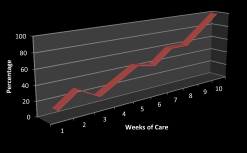10 Great Reasons to Stay Hydrated!
Water is essential to life. Our bodies are already 60%-70% water, and those reserves need to be replenished on a daily basis to keep us healthy. Add either extreme heat or extreme cold (both of which dehydrate us), and drinking enough water becomes even more critical.
Exactly how much water we should drink each day is an open question. As reported by the Mayo Clinic, the Institute of Medicine has determined that adequate water intake per day is roughly 3 liters (about 13 cups) for men and 2.2 liters (about 9 cups) for women. Some sources recommend more, some less, but there seems to be no question within the healthcare community that many of us should be drinking more water than we are. Here are a few reasons why:
1. Water curbs your appetite, and contains zero calories. Both of these reasons should have some appeal to you whether you’re actively trying to lose a few pounds or just trying to maintain a healthy weight. Studies have shown that often when people think they’re hungry, they’re really thirsty.
2. Water increases your energy levels. Studies have indicated that a cup of water can be more effective at boosting your energy levels than a cup of coffee. One suspected reason for this is that our perception of fatigue is often caused more by dehydration than actually being tired.
3. Water is good for your skin. Rather than investing in expensive creams and lotions, why not invest in a few more glasses of water per day? They will help to keep your skin healthy, radiant, and glowing. And it’s a lot less expensive than anything you could buy at the cosmetics counter.
4. Water increases your brain power. According to a study in Frontiers in Human Neuroscience, subjects who drank a glass of water before performing a series of cognitive tasks reacted faster and thought more clearly than subjects who did not.
5. Water helps maintain the balance of your other bodily fluids. You lose moisture daily via sweat and other excretions. Similarly, your blood, lymph, and intestinal fluids become depleted, and must be replenished with a proper intake of water.
6. Water improves your moods. Although there are many causes of depression, headaches, irritability, and fatigue, one of the most common is dehydration. When your body becomes low on water, your blood vessels dilate, causing all of these symptoms. Increasing your daily intake of water can counter and reverse them.
7. Water lowers your risk of heart attack. When your arteries and veins become clogged with plaque, you increase your likelihood of heart disease—one of the most effective ways of preventing this buildup of plaque is to remain properly hydrated. A study in the American Journal of Epidemiology found that drinking more water was positively associated with a decrease in the risk of coronary heart disease. Drinking liquids other than water increased this risk, according to the same study.
8. Water can keep your joints lubricated, too. The fluid that keeps your joints functioning properly and that keeps your bones from rubbing against each other becomes depleted when you are dehydrated. Drinking more water prevents this.
9. Water improves your digestion. Your ability to digest your food depends on the proper functioning of a series of enzymes in your intestinal tract. The “delivery mechanism” for these enzymes is water—don’t get enough of it, and your ability to digest and assimilate nutrients in your food breaks down.
10. Water even prevents fluid retention. This sounds counter-intuitive, but it’s true. Dehydration causes the body to retain water, because it thinks there is a critical lack of it. Drinking more water actually causes your body to stop retaining it.







